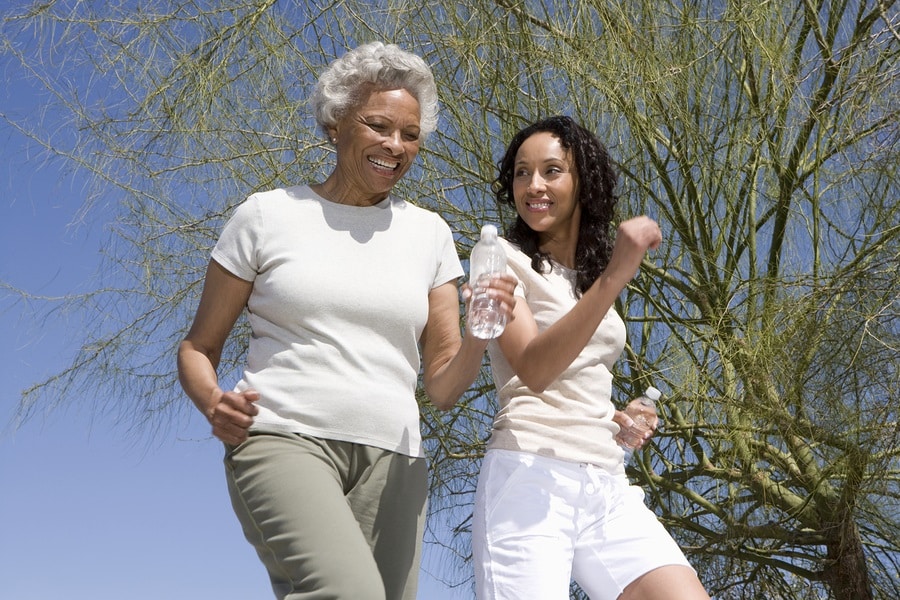Walking is one of the easiest yet most effective activities for people of all ages, including seniors. The activity, especially done daily, benefits them in several ways, from improved cardiovascular health to mood and better mobility. Home care assistance aides can encourage seniors to use the following strategies to keep their walking habits safe, fun, and efficient to maximize this low-impact activity.
Wear the Proper Footwear
Proper footwear is critical for avoiding discomfort and lowering the risk of injury. Seniors should wear supportive walking shoes with cushioned soles and sufficient arch support since these can help absorb impact and maintain stability. Shoes with a solid grip also help to avoid slips, which is especially important in uneven or damp areas. When shopping for shoes, home care assistance can encourage seniors to try on shoes later in the day, when their feet are slightly swollen, for a more accurate fit.
Warm Up and Cool Down
Muscles and joints become less flexible with age, making warming up and cooling down especially important. A few minutes of easy stretching or a slower-paced walk at the start helps to prepare muscles for activity. Similarly, a moderate cool-down at the end of the walk can help with the transition back to rest by minimizing stiffness and pain. Stretches for the calves, hamstrings, and lower back are also good for walkers.
Concentrate on Posture
Walking with proper posture can be more comfortable and reduce physical strain. Seniors should attempt to stand tall, relax their shoulders, and swing their arms freely. This helps to activate core muscles and promotes a steady, balanced walk. Home care assistance can offer gentle reminders, such as keeping the chin level and avoiding leaning forward, which will help seniors maintain good posture when walking.
Change the Routine for Increased Engagement
Variety can make walking routines interesting and possibly improve health benefits. Seniors should vary between varied walking routes, including modest inclines if possible, to improve leg strength and endurance. For those who prefer a challenge, short bursts of vigorous walking can boost cardiovascular health and metabolism. Also, seniors might enjoy exploring different routes in parks or nature trails, which can help make walking feel more like an experience rather than just a workout.
Use Walking Aids If Needed
Using walking aids such as a cane or walker can help seniors feel more confident and stable. Walking canes are lightweight, foldable, and have ergonomic handles. Nordic walking poles can also be beneficial since they work the upper body, improve posture, and provide stability. Regardless of what walking aid is used, it’s important to ensure it is appropriate for their height and mobility needs.

Stay Hydrated
Hydration is especially important for seniors, who may be less aware of thirst signals. Home care assistance can encourage them to bring a water bottle to drink before, during, and after their walk. Also, reminding seniors to listen to their bodies is important. If they feel fatigued or in pain, they need to take a break.
With a few thoughtful changes and the support of home care assistance, seniors can make the most of their walking routine, improving their health, mood, and quality of life.
Sources: https://www.healthinaging.org/tools-and-tips/tip-sheet-walking-older-adults#:~:text=If%20it’s%20been%20a%20long,if%20you%20have%20any%20problems
https://www.betterhealth.vic.gov.au/health/healthyliving/Walking-the-benefits-for-older-people
If you or an aging loved one are considering Home Care Assistance Services in Rancho Santa Fe CA, please call the caring staff at Canaan Home Care today! 1-844-CANAAN-1 (1-844-226-2261)
Canaan Home Care – A Premier Provider of Senior Home Care in the La Jolla, Del Mar, San Diego, Rancho Santa Fe, Newport Beach, Laguna Beach, Huntington Beach, Irvine, Tustin, and Manhattan Beach areas.
- Reduce Clutter and Reduce Stress This Spring - April 23, 2025
- Sight Issues Your Loved One With Alzheimer’s Disease May Experience - April 15, 2025
- Ways Respite Care Will Benefit Your Senior - April 9, 2025





